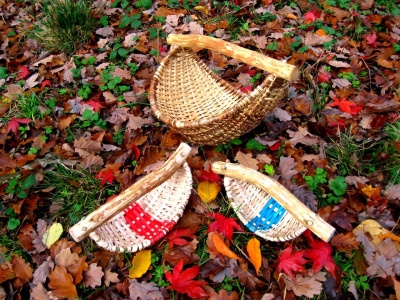
Make a split hazel 'swallow's nest' basket
- The Green Wood Centre
- 05 Jul 2025
Oral contraceptives that could significantly reduce grey squirrel populations in the UK are displaying positive results in ongoing research, the UK Squirrel Accord (UKSA) has announced today.
UKSA is funding research into a fertility control for grey squirrels that will offer an additional, non-lethal method to manage the population of this species. The resulting oral contraceptive and species-specific feeding hopper will support reductions in grey squirrel numbers to protect red squirrels and trees.
Important progress has been made in the development of a contraceptive for grey squirrels in laboratory trials as part of research being carried out by a team at the Animal and Plant Health Agency (APHA), with further tests being carried out to ensure it is safe and effective.
Vital progress has also been made in developing methods to deliver oral contraceptives to populations of grey squirrels, which is essential for practical field applications.
APHA has shown that a feed hopper with a weighted door will exclude most other species of wildlife, while still allowing more than 70% of local grey squirrel populations to access and eat from them. APHA is now testing different methods of keeping red squirrels out of the feeders, so contraceptives could be used in areas where there are both types of squirrel. So far, research has suggested that body weight could be used to distinguish between greys and reds. No oral contraceptive has been used in the field at this stage of the research.
UKSA is celebrating reaching its funding target for the research phase of the grey squirrel fertility control development. UKSA’s funding focus will now shift to the landscape-scale field trials and testing needed for registration of the final products, and knowledge sharing and awareness raising activities. The four phases needed to deliver the fertility control are:
Research and development – ending January 2024
Landscape-scale trials – in development
Testing for registration – in development
Widespread availability of registered methods
Kay Haw, Director of the UK Squirrel Accord, said “It is wonderful to see support for this novel work increasing exponentially. We are incredibly thankful to everyone that donated to the research phase. Donations came from across the forestry and conservation sectors (including UKSA signatories), private individuals and estates, and grant-making organisations. We will now focus on fundraising for the next key phases of the programme and wider UKSA activities.”
Grey squirrels cause damage to woodlands by stripping bark from trees aged between 10-50 years, the young trees in a forest. They are also one the main reasons for local extinctions of red squirrels in large areas of the UK.
They target broad-leafed varieties, including oak, which are ecologically important because they support so many other species. It is estimated the UK is home to around three million of these invasive rodents.
The UK Squirrel Accord (UKSA) is a UK-wide partnership of 41 leading conservation and forestry organisations, Government agencies and companies, with links to red squirrel community groups.
An update webinar to share more detailed information on progress with the grey squirrel fertility control research is planned for 13 July 2022: https://us02web.zoom.us/webinar/register/WN_KMCYY2VKS-uoI8MSD_nybg